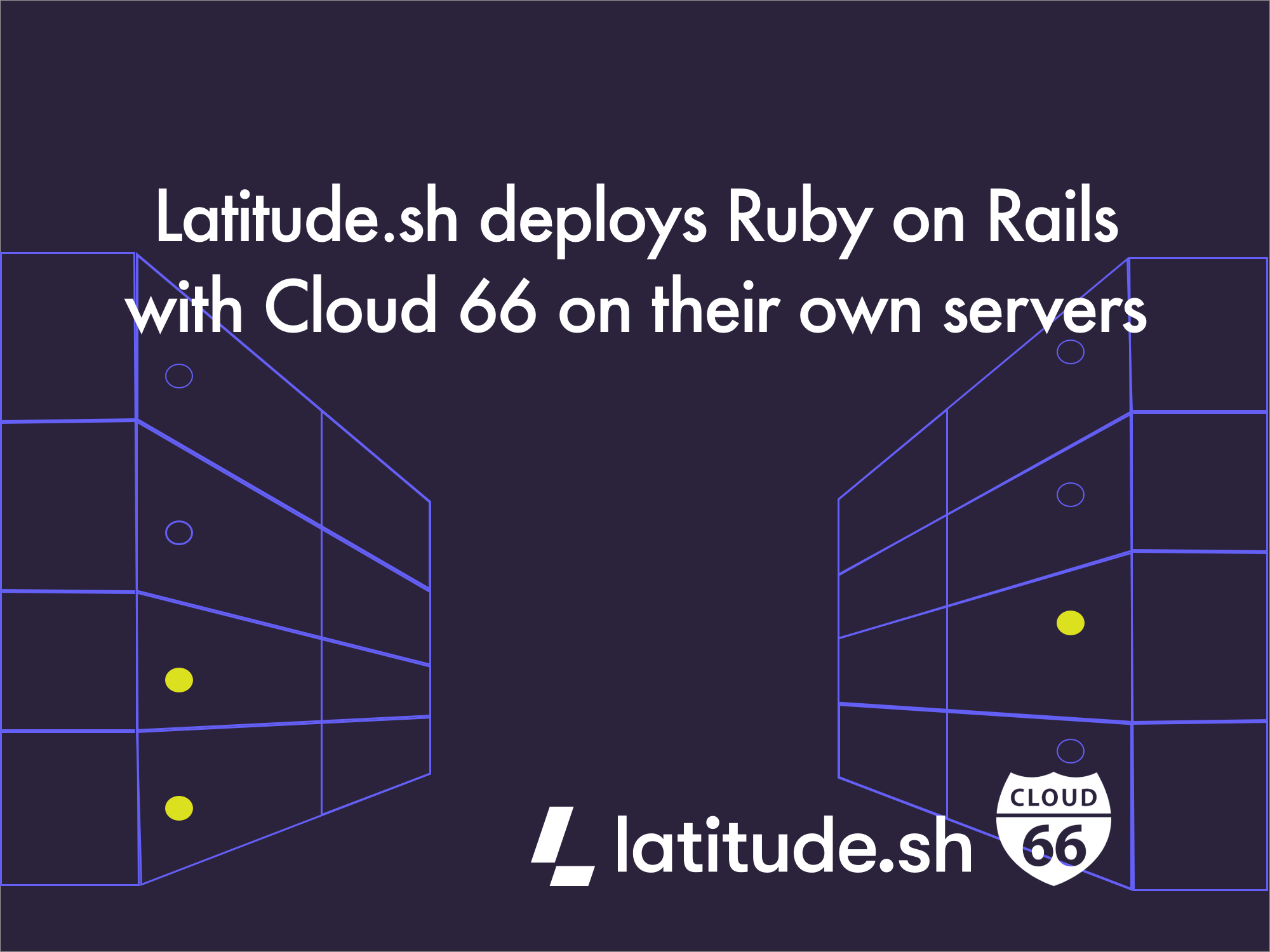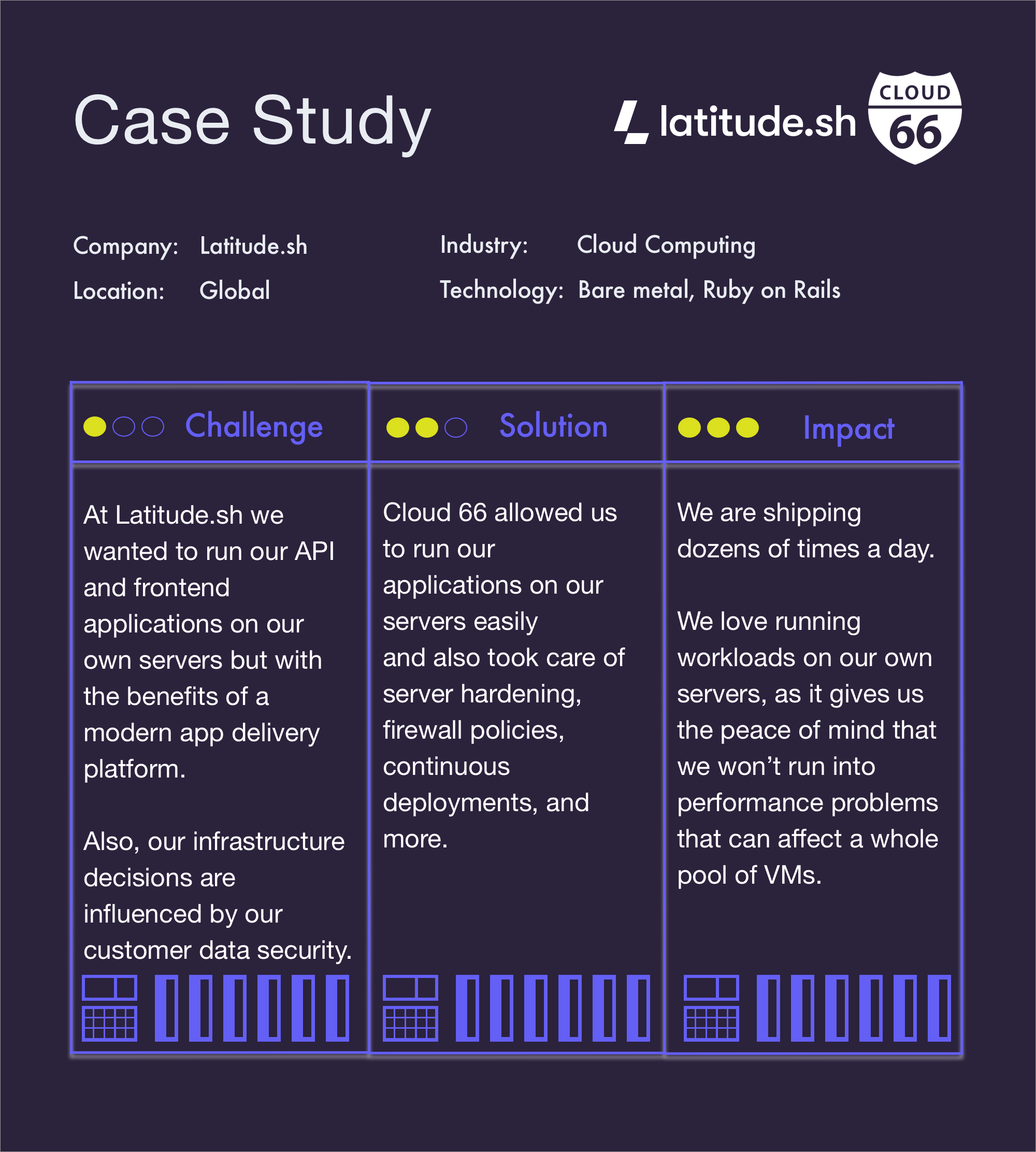
Update: Maxihost is now Latitude.sh.
This case study features Latitude.sh, a bare metal cloud provider with 20 years of experience. Since 2018 Latitude.sh has deployed and managed Ruby on Rails applications with Cloud 66 on their own servers.
About Latitude.sh
Latitude.sh was founded by Guilherme Soubihe in Brazil in 2001. After building a strong customer base in Brazil, they started expanding globally with points of presence in Chile, the USA, Australia, and most recently Japan, with Mexico launching very soon.
The Latitude.sh Platform combines the performance and security of bare metal servers with the automation and flexibility capabilities of the cloud, allowing developers to deploy a dedicated instance in minutes across different locations around the world.
Driven by the mission to make the internet faster, Latitude.sh does a lot of the heavy lifting, allowing their customers to spend less time on infrastructure management.
Latitude.sh features:
- Offers: Bare Metal Cloud, DDoS Protection, Custom Deployments
- Multiple regions: Their core data center regions are in Sao Paulo, Santiago, Miami, Chicago, New York, Dallas, Los Angeles, Tokyo, and Sydney. Custom regions are available on demand.
- Compatible with the most popular operating systems: Windows, Linux, Ubuntu, Redhat, CentOS, Debian, ESXi, and more.
- Security: DDoS protection and managed hardware firewalls.
- Unlimited inbound traffic and 20TB Outbound for each bare metal server on premium Tier 1 Network and Internet Exchanges.
- Dashboard and API.
- 24hr specialized support.
Who is using Latitude.sh?
Latitude.sh was built for developers who build streaming, VPN, CDN, online gaming, and other types of applications. Amongst Latitude.sh's customers are Algolia, Pango, Gamers Club, StudioSol, Mubi, AnyDesk, and more.
How to get started?
To get started visit the Latitude.sh website and sign up. And if you have any questions get in touch and drop them a line.
To find out more about Latitude.sh, I got in touch with Eduardo Soubihe, their CTO.

Eduardo, can you tell us more about Latitude.sh and your experience with Cloud 66?
At Latitude.sh we’re very concerned with our customers' data, leading us to make infrastructure decisions that take this into account. Deploying our applications was no different.
In 2018 we wanted to run our API and frontend applications on our own servers for security and performance purposes, but also get the benefits of a modern application delivery platform.
Cloud 66 was a no-brainer; it not only allowed us to run our applications on our servers much more easily, but also took a lot of hard work off our plates, like server hardening, firewall policies, continuous deployments, and more.
Can you give us an overview of your bare-metal cloud needs?
We are shipping dozens of times a day, so having a robust yet easy-to-use application delivery platform is a must for us. We also love running workloads on our own servers, as it gives us the peace of mind that we won’t run into performance problems like noisy-neighbour or hypervisor security issues that can affect a whole pool of VMs.
Our requirements were a platform that allowed us to deploy on our own infrastructure, but also required the least amount of effort from DevOps and Software Engineers.
Why Rails and what are your favourite Cloud 66 features?
Rails has a vibrant developer community and is a great option for building robust and scalable applications like APIs.
We use most Cloud 66 features, from managing firewall rules from the UI to setting up background jobs and creating backups. This effectively allowed us to deploy more often and more confidently, without relying on PaaS platforms that lock you in on their infrastructure. We love that we can easily set up background jobs and manage firewall rules and security from a single platform.
What are Latitude.sh's future plans?
Latitude.sh continues to execute on a strategy to increase distribution by launching new regions and creating tools that make it easier for developers to deploy and maintain their workloads in bare metal servers. For the next year, we have plans to continue increasing our global footprint while giving more focus to network automation with the general availability of a Private VLAN feature that will make it easy for customers to connect servers in the same region without having to go through the public internet.
We have spent the last several months working on a new version of the Latitude.sh API and dashboard, which greatly improves performance and introduces features that are constantly requested by customers.
Thanks Eduardo!
It was great to catch up with Eduardo Soubihe from Latitude.sh and learn more about the needs of a bare metal cloud platform. Eduardo, thank you for finding the time to discuss your work and your experience with Cloud 66. We have been working closely with the Latitude.sh team and we cannot wait to share with you what we’ve cooked up. Watch the space!
UPDATE : We are pleased to announce that Cloud 66 partners with Latitude.sh, a global bare metal cloud provider built for developers. For more information check out our blog post announcement 'Latitude.sh partners with Cloud 66. Deploy your applications on bare-metal servers with ease.'
Or watch 2 min video to see how to deploy your application to bare metal server with Latitude.sh (AKA Maxihost) and Cloud 66.
